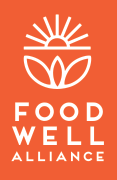UGA, Food Bank of Northeast Georgia partner to increase access to local food, jobs
/Flickr CC by lynn Dombrowski
Athens, Ga. - The Food Bank of Northeast Georgia's food hub, housed in its Rabun County facility, will be the first in the country to leverage a regional food bank's supply chain to help farmers aggregate and preserve their produce. In partnership with University of Georgia Extension, the organizations will join forces to increase access to local food and local jobs.
UGA Extension will provide food hub farmers with business and technical training needed to make the most of the new distribution system.
The project will help small and beginning farmers meet the growing demand for local produce and access to flash-freezing equipment. The frozen food line will not only allow farmers to sell their produce year-round, but will also supply the food bank's clients with more locally sourced vegetables.
"If they can build a year-round market by putting some of their bumper crop up to sell later, that will help with cash flow," said John Becker, the food bank's executive director. "This is going to allow farmers to do more with the produce or allow them to expand their farms and make a go of it."
The training program and logistics services will be available to farmers this growing season. The flash-freezing system should be available in late fall.
Currently, the food hub is looking for farmers from Rabun, Towns, White, Habersham, Stephens, Franklin, Banks, Hart, Jackson, Madison, Oglethorpe, Barrow, Clarke and Oconee counties.
If the partnership between the food bank and UGA is successful, the Food Hub of Northeast Georgia could become a national model for food hubs. Currently, several models—from for-profit aggregator companies to farmer cooperatives—are being tested across the country.
"We are excited to be part of this project," said Julia Gaskin, sustainable agriculture coordinator in the UGA College of Agricultural and Environmental Sciences. "There are a number of local food initiatives in Northeast Georgia that have gotten the ball rolling. We hope this partnership will really help provide new opportunities for small farms and beginning farmers."
Gaskin has been working with Becker to get the food hub project off the ground for the past three years. The food bank has hired a food hub manager, T.J. Smith, to manage the project in Rabun County, and the partnership is now recruiting farmers. UGA Extension has hired a new agricultural and natural resources Extension agent, Amber Arrington, to help provide support to the food hub project. While UGA Extension has agents in most of Georgia's 159 counties, Rabun County has not had a full-time agent for several years, Gaskin said.
A growing number of small-scale growers find they have too much produce for a farmers market or a community-supported agriculture system but not enough to meet the needs of restaurants, schools or grocery stores. The food hub will pull these small- and medium-size farms together so they can pool their products to fill large orders.
The food bank, which collects and distributes food over a 14-county area in Northeast Georgia, will use a network of trucks, truck drivers and warehouses to support the regional food hub.
"Having access to more fresh vegetables helps on the supply side," Becker said. "Helping local farmers expand their markets, and maybe their farms, will help create jobs. If someone has a better job, they may not need to utilize the food bank or food pantry system. So it will help on the supply side, but it will also help on the demand side."
Together with farm business training programs offered through UGA Extension, the food hub project and the frozen food equipment will allow farmers to expand their operations—making family farms economically profitable.
UGA Sustainable Agriculture's collaboration with the food bank is one part of a larger outreach program for beginning and small farmers and ranchers. For more information, visitwww.SustainAgGA.org.
Founded in 1992, the Food Bank of Northeast Georgia distributed nearly 10.3 million pounds of food (or the equivalent of 8.3 million meals) through 215 partner agencies in 2012. For more information, visit www.foodbanknega.org.
Get full coverage: UGA Today.
The views expressed here belong to the speaker and do not necessarily represent Food Well Alliance.




